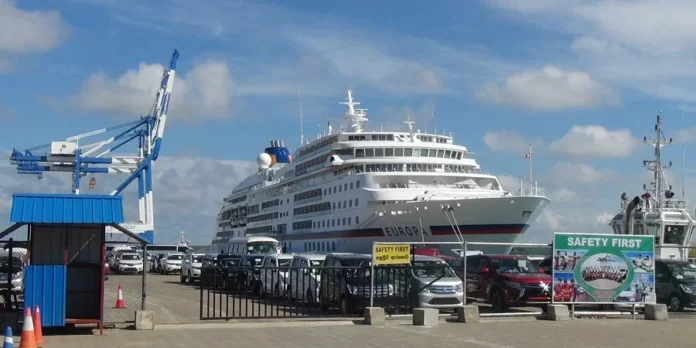According to Indian reports, the Yuan Wang 5 could be employed for space and satellite tracking and has specific uses in intercontinental ballistic missile launches.
COLOMBO: The Sri Lankan government has allowed a high-tech Chinese research ship to dock at the southern port of Hambantota on August 16, official sources here said on Saturday.
The Chinese ballistic missile and satellite tracking ship, ‘Yuan Wang 5’, was earlier scheduled to arrive on Thursday and remain at the port until August 17 for replenishment.
However, the Sri Lankan foreign ministry requested the Chinese embassy here last week to postpone the vessel’s visit following security concerns raised by India.
Subsequently, the vessel did not dock at the Hambantota port on Thursday as planned.
According to the sources, the government has finally permitted the ship to dock at the port.
It will now arrive on August 16 and remain at the port till August 22, they said.
The ship was awaiting clearance to enter from its location 600 nautical miles away east of Hambantota.
Meanwhile, the matter created much controversy in the island nation with the Opposition blaming the government for what they termed mishandling of the issue.
The southern deep-sea port of Hambantota is considered strategically important for its location.
The port has been developed largely with Chinese loans.
India has said it carefully monitors any development having a bearing on its security and economic interests.
“We are aware of reports of a proposed visit by this vessel to Hambantota in August,” External Affairs Ministry Spokesperson Arindam Bagchi had said in New Delhi when asked about the reports of a proposed visit by a Chinese vessel.
ALSO READ | Days after Chinese ship’s suspended visit, Pakistan warship arrives in Lanka
“The government carefully monitors any development having a bearing on India’s security and economic interests and takes all necessary measures to safeguard them,” he said last month.
New Delhi is concerned about the possibility of the ship’s tracking systems attempting to snoop on Indian installations while being on its way to the Sri Lankan port.
India has traditionally taken a stern view of Chinese military vessels in the Indian Ocean and has protested such visits with Sri Lanka in the past.
The ties between India and Sri Lanka came under strain after Colombo gave permission to a Chinese nuclear-powered submarine to dock in one of its ports in 2014.
India’s concerns have been focused on Hambantota port in particular.
In 2017, Colombo leased the southern port to China Merchant Port Holdings for 99 years, after Sri Lanka was unable to keep its loan repayment commitments, fanning fears over the potential use of the port for military purposes.
On Monday, the Chinese Foreign Ministry said it was “completely unjustified for certain countries to cite the so-called “security concerns” to pressure Sri Lanka.
ALSO READ | ‘India’s security concern’, Chinese ship awaits clearance at Sri Lanka’s Hambantota port: Official
India on Friday rejected China’s “insinuations” that New Delhi pressured Colombo against the planned visit by the Chinese research vessel but asserted that it will take decisions based on its security concerns.
External Affairs Ministry Spokesperson Arindam Bagchi said Sri Lanka, as a sovereign country, makes its own independent decisions and noted that India would make its judgment on its security concerns based on the prevailing situation in the region, especially in the border areas.
China is the main creditor of Sri Lanka with investment in infrastructure.
Debt restructuring of Chinese loans would be key to the island’s success in the ongoing talks with the International Monetary Fund for a bailout.
India, on the other hand, has been Sri Lanka’s lifeline in the ongoing economic crisis.
It has been at the forefront of extending economic assistance of nearly USD 4 billion to Sri Lanka during the year as the island nation is grappling with the worst economic crisis since independence in 1948.
Source: The New I-Express

